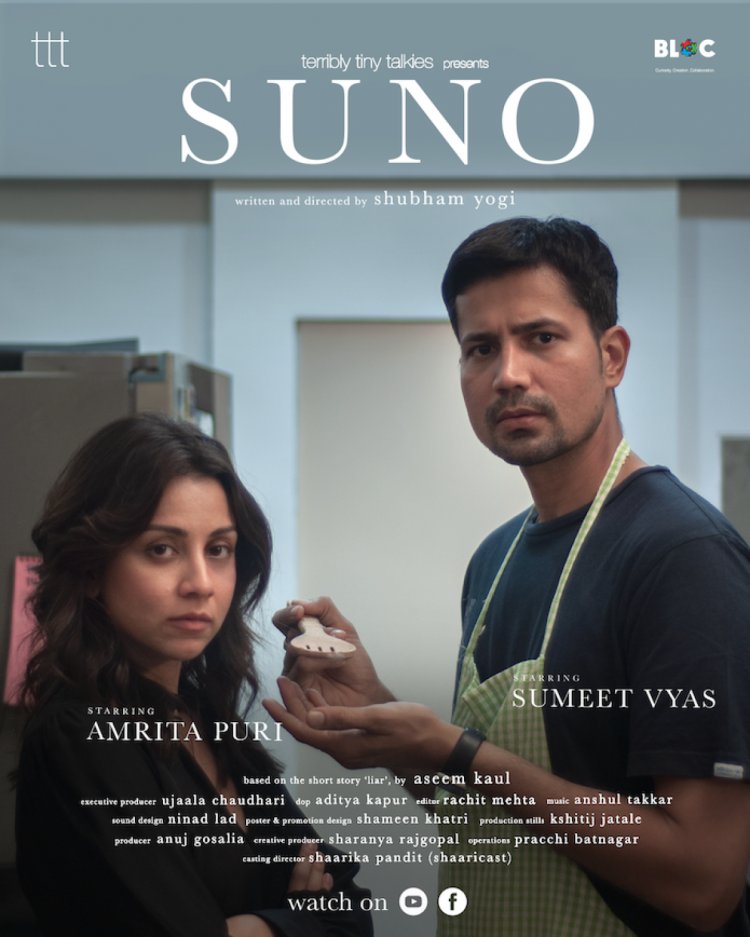Suno

‘Suno’ is a subtle take on the thin line between violently abusing and subtly exploiting
The film brings out the very important face of abuse which is nothing that you would expect it to be.
There are villains who willfully take their course of action with the fatal intention of causing harm and there are victims who fall prey to the villain’s intended actions. While the former resides on the giving end and the latter is pushed to the receiving end, the only line of similarity between the two is their awareness of what state they are in. The villain is well aware that whatever action he/she is about to take will evidently hurt the person who is on the receiving end. Similarly, the victim is aware of the helpless nature of his/her state where they are subjected to villainy and hence, find a way to avenge the wrong deeds done to them. However, in the case of Subham Yogi’s short film, ‘Suno’, neither the victim nor the villain is aware of what state they are in.
The film, based on a short story by Aseem Kaul and released on YouTube through the channel Terribly Tiny Tales, follows a well-to-do couple, played by Amrita Puri and Sumeet Vyas, who in the beginning discuss about a visible injury on the wife’s face. While the husband casually passes out the mark on her face as an accident, the wife’s face tells a whole different story. She is at first bothered to have a huge scar on her face and then confused about the state of the whole situation. Considering her husband’s words it was a mere kink gone very wrong, it all appears to be just a mistake, but the gaze of the world made her conscious about the intensity of that mistake. She is soon invited at a support group with other women who share their experiences about domestic violence, and later on we hear her confessing to her husband that she agreed upon the fact he beat her.
A well-to-do couple find themselves in an unexpected situation.
Up till this point the viewer, too, is left in an equally confused position from where the husband does not seem to be an abuser and the wife is not sure about her state of being in all the confusion. None of them are aware of the seriousness of the situation, yet none are willing to talk about it unless the wife tells her husband that she has told them he beat her. At this point the film begins to take a different turn and the seemingly calm husband is at once alarmed by what she has done. Even for the next few minutes it can easily be passed of as pretentious pleas for victimization where the husband is guiltless but then there is one sentence that changes the course of the whole story. The wife asks, “Kya tumne us raat meri marzi puchi thi (Did you ask me what I wanted that night?)”. Both of them go completely numb after that as the husband sinks to his seat and the frame closes up on the wife’s face, thus concluding the moment of clarity they both had as the villain and the victim.
The charm of a film like ‘Suno’ lies in the fact it does not overplay emotions that are seemingly easy to understand but complicated to come to terms with. The couple, at no point, give us a hint about the tension of power-play between them but at the same time there is a hint of that staggering line between the suppressor and the suppressed that even they don’t see unless a third party points it out. The film revolves smoothly around the idea that the world often sees through things that we fail to see in our loved ones, but once we see it that glass of purity is shattered to pieces. Almost reminiscing Amitabh Bachchan’s dialogue in ‘Pink’, “a No means NO!”, we are left with a note of guilt when we hear the wife saying that she had refused only he didn’t want to hear it. Even when it is as subtle and almost invisible as the husband’s wish to simply kink things up in their sexual life, it is inevitably an abuse if the partner does not wish to carry out the same act.
Sharanya Rajgopal, Studio Head of Terribly Tiny Talkies, said in a press release, “ ‘Suno’ is an incredibly important film for us. It’s unlike any other story we’ve attempted yet. Films have the ability to not just mirror society but also make it think. We hope this short film sparks a conversation around the lines we must draw in relationships.” On the other hand, Yogi said in a supportive statement, “As much as Suno is a product of our times, it is also a result of Sharanya's (Sharanya Rajgopal, Studio Head, TTT) persistence to get this film made. [With TTT] filmmakers the liberty to preserve the original voice, while also contributing effectively in the creative collaboration".















































